
“To continue to animate the synodal process in the ordinary life of the Church, identifying which pathways the Spirit invites us to walk along more decisively as one People of God.” This is the objective of the final phase of the Synod, whose Instrumentum laboris was published today, the “working instrument” drafted on the basis of all the material gathered during the listening phase, and in particular the final documents of the Continental Assemblies. “The journey so far, especially the continental stage – reads the Foreword of the document, which closes the first phase of the Synod, the first that reflects the “bottom up” process called for by Pope Francis, “For a Synodal Church: communion, participation, mission” and opens the second phase, composed of the two sessions (October 2023 and October 2024) in which the XVI Ordinary General Assembly of the Synod of Bishops will take place – has made it possible to identify and share the particular situations experienced by the Church in different regions of the world, notably “the reality of too many wars that stain our world with blood, leading to a call for a renewed commitment to building a just peace.” The document consists of two parts, section A, titled “For a Synodal Church”, highlights the fruits of the path covered so far, while section B, titled “Communion, mission, participation”, expresses in the form of three questions, the priorities that most strongly emerge from the work of all the continents, thus placing them before the Assembly for discernment. In order to assist the working process of the Synodal Assembly, especially the group work (Circuli Minores), five worksheets are proposed for each of the three priorities, allowing them to be approached from different perspectives.
Abuses and remarried divorcees. “In many regions, the Churches are deeply affected by the crisis caused by abuse” – reads the text – the culture of clericalism and the different forms of abuse (sexual, financial, spiritual and of power), erode the credibility of the Church and compromise the effectiveness of its mission.” The document calls for “concrete steps to welcome those who feel excluded from the Church because of their status or sexuality”, for example, “remarried divorcees, people in polygamous marriages, LGBTQ+ people”. Another question that should be addressed is “how can we be more open and welcoming towards migrants and refugees, ethnic and cultural minorities, and indigenous communities who have long been part of the Church but are often on the margins to better embrace their presence as a gift?”
Authority and primacy. The Instrumentum laboris highlights the importance of the primacy of the Chair of Peter, along with the need to “rethink decision-making processes”, with a view to “healthy decentralization” inside the Church. “A diversity of charisms without authority becomes anarchy, just as the rigour of authority without the richness of charisms, ministries and vocations becomes dictatorship”, the document warns. “How should the role of the Bishop of Rome and the exercise of his primacy evolve in a synodal Church?”, is one of the challenges that lie ahead, bearing in mind that “participation, governance and authority – sometimes succinctly referred to by the English term leadership—take a variety of forms within the Church.” “An attitude of service and not of power or control; transparency, encouragement and the flourishing of the person; a capacity for and competence of vision, discernment, inclusion, collaboration and delegation” are the features of a Synodal missionary Church, where “the ability and willingness to listen” are key. There ensues a need for special formation specifically in these skills and competences f”or those in positions of responsibility and authority, as well as on more participatory selection procedures, especially with regard to the selection of Bishops.”
Lay persons and women. “Give new impetus and more incisive competence to the special participation of the Laity in evangelisation in the various spheres of social, cultural, economic and political life.” The document likewise addresses the theme of the “new ministries” at the service of a “synodal Church”, with the goal of “effective participation in co-responsible mission” with the involvement of the Faithful who, for various reasons, are on the margins of community life.” In particular, the Instrumentum laboris voices the need for “greater recognition of the baptismal dignity of women”, so that “equal dignity” may “find ever more concrete realisation in the life of the Church, including through relationships of mutuality, reciprocity and complementarity between men and women”, rejecting “all forms of discrimination and exclusion” and ensuring “a greater presence of women in positions of responsibility and governance.”
Married priests and digital environment. “Could a reflection be opened concerning the discipline on access to the Priesthood for married men, at least in some areas?”, is the question raised in the text, which, referring to the candidates to the priesthood, calls for “a reform of seminary curricula and teaching programmes in colleges and schools of theology.” “The digital environment now shapes the life of society”, the document states, advocating the update of languages and “accompaniment” in this environment, through appropriate pathways. “How can we encourage the pioneering activity of young people who are especially co-responsible for the Church’s mission in this space?”, is yet another question requiring an urgent answer. The document rejects the various forms of “cultural colonization”, while calling for a “preferential option” for young people and families “which recognises them as subjects and not objects of pastoral care.”


